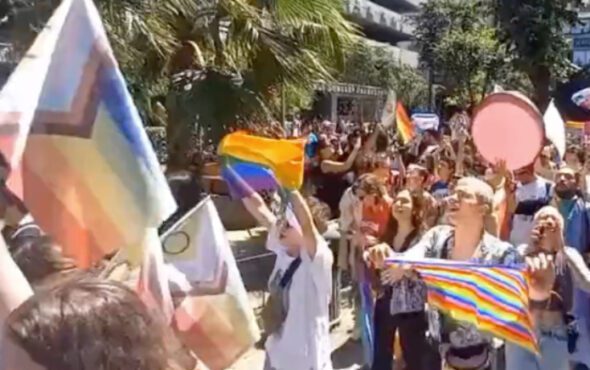
Hundreds of people defied a ban on staging an annual LGBTQ+ Pride march in Istanbul, resulting in more than 40 activists being detained.
On 25 June, demonstrators waved rainbow flags as they took part in peaceful rallies in the Nişantaşı neighbourhood after they were banned from Taksim Square.
Despite the heightened police presence and arrests made, the march was able to go ahead without any street clashes or police violence – though it did finish earlier than anticipated.
“The governor of Istanbul said that ‘any activity that threatens the institution of the family’ would not be allowed, and the police closed Taksim,” someone who took part in the march wrote on Twitter. “But LGBTI+s found a way around and did not give up on the march!”
This year’s Pride event took place against a backdrop of a homophobic election campaign fuelled by anti-LGBTQ+ rhetoric, which came to an end just last month.
READ MORE: Thousands march in anti-LGBTQ+ protest in Istanbul
Conservative president Recep Tayyip Erdoğan emerged victorious, meaning he will be in power until 2028.
Earlier this year, the government suggested amendments to the Turkish Constitution to redefine ‘family’ as “the joining of a man with a woman” – something which exacerbated hostility towards the country’s LGBTQ+ community.
“The government has helped whip up prejudice”
Two days before the Pride march took place, Amnesty International warned LGBTQ+ people of “a brazen and deepening crackdown” taking place in Turkey.
“As thousands take to the streets of Istanbul and Izmir in defiance, they risk facing tear gas and rubber bullets. The authorities should allow LGBTI Pride Marches in Türkiye to go ahead safely and without interference,” Nils Muižnieks, Amnesty International’s Europe Director, said.
“By ramping up anti-LGBTI rhetoric, the government has helped whip up prejudice, emboldening anti-LGBTI groups in Türkiye, some of which have called for violence against LGBTI communities. Under the pretext of protecting family values, the authorities are denying LGBTI people the right to live freely.”



